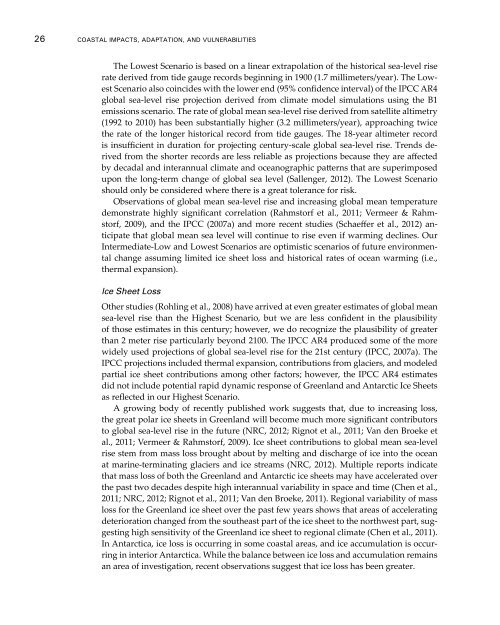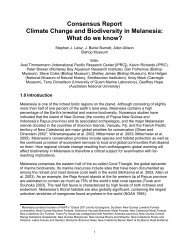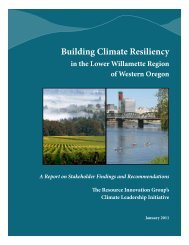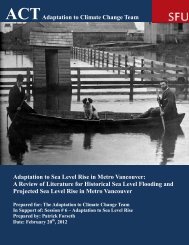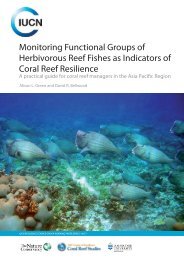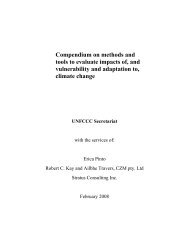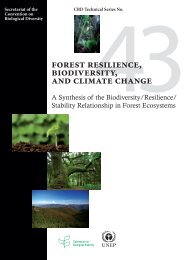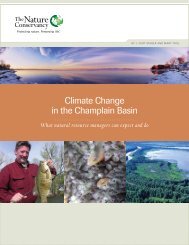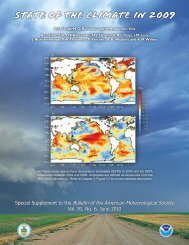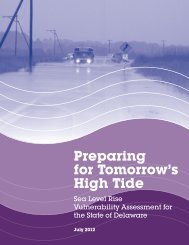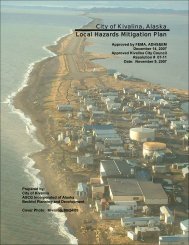Coastal Impacts, Adaptation, and Vulnerabilities - Climate ...
Coastal Impacts, Adaptation, and Vulnerabilities - Climate ...
Coastal Impacts, Adaptation, and Vulnerabilities - Climate ...
You also want an ePaper? Increase the reach of your titles
YUMPU automatically turns print PDFs into web optimized ePapers that Google loves.
26 <strong>Coastal</strong> <strong>Impacts</strong>, <strong>Adaptation</strong>, <strong>and</strong> <strong>Vulnerabilities</strong>The Lowest Scenario is based on a linear extrapolation of the historical sea-level riserate derived from tide gauge records beginning in 1900 (1.7 millimeters/year). The LowestScenario also coincides with the lower end (95% confidence interval) of the IPCC AR4global sea-level rise projection derived from climate model simulations using the B1emissions scenario. The rate of global mean sea-level rise derived from satellite altimetry(1992 to 2010) has been substantially higher (3.2 millimeters/year), approaching twicethe rate of the longer historical record from tide gauges. The 18-year altimeter recordis insufficient in duration for projecting century-scale global sea-level rise. Trends derivedfrom the shorter records are less reliable as projections because they are affectedby decadal <strong>and</strong> interannual climate <strong>and</strong> oceanographic patterns that are superimposedupon the long-term change of global sea level (Sallenger, 2012). The Lowest Scenarioshould only be considered where there is a great tolerance for risk.Observations of global mean sea-level rise <strong>and</strong> increasing global mean temperaturedemonstrate highly significant correlation (Rahmstorf et al., 2011; Vermeer & Rahmstorf,2009), <strong>and</strong> the IPCC (2007a) <strong>and</strong> more recent studies (Schaeffer et al., 2012) anticipatethat global mean sea level will continue to rise even if warming declines. OurIntermediate-Low <strong>and</strong> Lowest Scenarios are optimistic scenarios of future environmentalchange assuming limited ice sheet loss <strong>and</strong> historical rates of ocean warming (i.e.,thermal expansion).Ice Sheet LossOther studies (Rohling et al., 2008) have arrived at even greater estimates of global meansea-level rise than the Highest Scenario, but we are less confident in the plausibilityof those estimates in this century; however, we do recognize the plausibility of greaterthan 2 meter rise particularly beyond 2100. The IPCC AR4 produced some of the morewidely used projections of global sea-level rise for the 21st century (IPCC, 2007a). TheIPCC projections included thermal expansion, contributions from glaciers, <strong>and</strong> modeledpartial ice sheet contributions among other factors; however, the IPCC AR4 estimatesdid not include potential rapid dynamic response of Greenl<strong>and</strong> <strong>and</strong> Antarctic Ice Sheetsas reflected in our Highest Scenario.A growing body of recently published work suggests that, due to increasing loss,the great polar ice sheets in Greenl<strong>and</strong> will become much more significant contributorsto global sea-level rise in the future (NRC, 2012; Rignot et al., 2011; Van den Broeke etal., 2011; Vermeer & Rahmstorf, 2009). Ice sheet contributions to global mean sea-levelrise stem from mass loss brought about by melting <strong>and</strong> discharge of ice into the oceanat marine-terminating glaciers <strong>and</strong> ice streams (NRC, 2012). Multiple reports indicatethat mass loss of both the Greenl<strong>and</strong> <strong>and</strong> Antarctic ice sheets may have accelerated overthe past two decades despite high interannual variability in space <strong>and</strong> time (Chen et al.,2011; NRC, 2012; Rignot et al., 2011; Van den Broeke, 2011). Regional variability of massloss for the Greenl<strong>and</strong> ice sheet over the past few years shows that areas of acceleratingdeterioration changed from the southeast part of the ice sheet to the northwest part, suggestinghigh sensitivity of the Greenl<strong>and</strong> ice sheet to regional climate (Chen et al., 2011).In Antarctica, ice loss is occurring in some coastal areas, <strong>and</strong> ice accumulation is occurringin interior Antarctica. While the balance between ice loss <strong>and</strong> accumulation remainsan area of investigation, recent observations suggest that ice loss has been greater.


